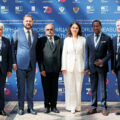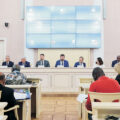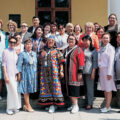On July 1-2, Saint Petersburg hosted the 2nd High-Level International Conference “World Treasury of Mother Tongues: Nourish and Cherish. National and International Context, Policies and Practices to Preserve Indigenous Languages” dwelling upon the most pressing issues of linguistic diversity.
The conference was organized by the Commission of the Russian Federation for UNESCO, the Ministry of Foreign Affairs of the Russian Federation, the Russian Committee of the UNESCO Information for All Programme, the Federal Agency for Ethnic Affairs, the Interregional Library Cooperation Center with the support of the Ministry of Digital Development, Communications and Mass Media of the Russian Federation.
The 2nd High-Level International Conference became a landmark event within the framework of the International Decade of Indigenous Languages (2022–2032) with the aim of drawing attention to the matter of catastrophic loss of indigenous languages and to the urgent need to preserve, restore, and promote these languages.
“The International Conference is one of the most significant events of the International Decade of Indigenous Languages 2022–2032. This ambitious United Nations initiative, which is entrusted to UNESCO, aims to ensure that ‘indigenous languages are sustained, as a vehicle of living heritage.’ Within the framework of the Decade, Russia is actively sharing its experience in maintaining multilingualism with the Organization’s member states. The fact that your meeting is taking place for the second time testifies to the relevance of international efforts to jointly seek answers to the pressing issues the indigenous peoples of Russia and other countries face every now and then,” said Foreign Minister of Russia Sergey Lavrov in his welcoming address.
The conference was attended by about 150 Russian and foreign specialists in culture, education, social and human sciences, communication and information. The geography of the participants covered more than 40 countries from all continents of the globe.
During the conference, experts discussed the challenges faced by linguistic diversity, policies to support and develop indigenous languages, and the activities by multilingualism support institutions. In his speech, Igor Barinov, head of the Federal Agency for Ethnic Affairs (FADN), emphasized that Russia’s state language policy is based on historical experience, in-depth analysis of the current state, and development trends. Deputy head of FADN Stanislav Bedkin noted the importance of introducing national languages into the digital environment. He claimed that 22 languages are being digitized: work is under way on providing them with fonts, keyboard layouts, machine translators, and speech synthesizers. Director of the House of Peoples of Russia Anna Polezhaeva said that this year the ethno spelling test took place in all national languages of Russia for the first time in history.
The conference also featured reports on state support for native languages in the education system, the creation of a personal-developmental educational environment for teaching native languages in urban settings, professional development for teachers of indigenous languages, and much more.
Yana Samarina



